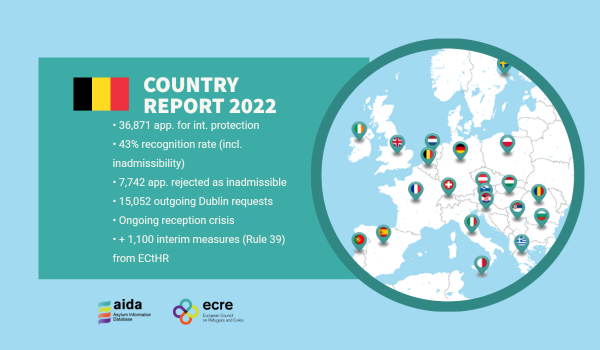The updated AIDA Country Report on Belgium provides a detailed overview on legislative and practice-related developments in asylum procedures, reception conditions, detention of asylum seekers and content of international protection in 2022. Further, the report includes an annex providing an overview of temporary protection.
In 2022, a total of 36,871 applications for international protection were lodged. 10,632 persons were granted refugee status and 429 subsidiary protections, bringing the total recognition rate to 43%. A total of 13,041 persons were refused international protection (57%). It should be mentioned, however, that this covers both the number of persons who received a decision refusing refugee status and refusing subsidiary protection status (7,742) and those whose applications were declared inadmissible after subsequent applications and towards beneficiaries of international protection in another member state (4,253) or were declared manifestly unfounded (1,046). By the end of 2022, 16,415 cases (concerning 19,157 persons) were pending before first instance authorities. In the context of the Dublin procedure, a total of 15,052 outgoing requests were sent to other states, 8,735 of which were accepted. Despite this, only 831 persons were effectively transferred from Belgium to other Member States throughout the year.
In the context of the reception crisis that started in mid-October 2021, access to the asylum procedure has been severely impacted in 2022. In several instances in the first half of 2022, the number of persons allowed to apply for international protection at the ‘arrival centre’ was limited to the places available on that day in the reception system, which led to people having to queue outside for days. When the situation was slightly improving, Russia’s war of aggression in Ukraine and the subsequent influx of refugees led to the situation deteriorating again.
The shortage of places in reception centres worsened, and available places are given in priority to ‘the most vulnerable’ applicants for international protection. Yet, at the end of 2022, there were days when not all families with children and unaccompanied minors received access to the reception network. Adult single male applicants for international protection are systematically denied access to the reception network and have to register on a waiting list. Over the course of the reception crisis, various legal proceedings were initiated against Belgian asylum authorities; these led to more than 8,000 convictions of the federal reception agency (Fedasil) at the national level and more than 1,100 interim measures issued by the European Court of Human Rights (Rule 39). Even after receiving a positive court injunction, applicants have to wait for several months before receiving an invitation to access the reception network. During this time, they are forced to sleep rough (on the street, in tents or squats) or seek shelter with friends or family. Medical civil society organisations such as Doctors of the World and Doctors Without Borders have denounced the dire medical situation of destitute applicants on numerous occasions. Also in the context of the reception crisis, some applicants received international protection without access to the reception network. The absence of an address has serious implications when it comes to obtaining a residence permit (A-card) at the local commune which subsequently creates difficulties to secure financial aid, open a bank account or to rent accommodation.
Regarding detention conditions, the UN Committee against Torture formulated its concerns about the continued practice of systematic detention of asylum seekers at the border. Besides, in two decisions of March 2022, Belgium was condemned by the Committee on the Rights of the Child for having detained children in the family units of a repatriation centre. Belgium has already been condemned before by the ECtHR for the detention of children in closed centres that provided inhumane living conditions. Positively, in the context of the ‘Migration Deal’ of 9 March 2023, the government has announced it would officially insert the prohibition of child detention into the law.
Difficulties are ongoing concerning family reunification for international protection beneficiaries. Specifically, Afghan family members encounter various problems when applying for a visa in view of family reunification since the takeover of power by the Taliban. Without swift changes, international protection beneficiaries cannot realise their right to family reunification in practice.
For further information:
- Find comparative information in the Asylum Information Database (AIDA) managed by ECRE

